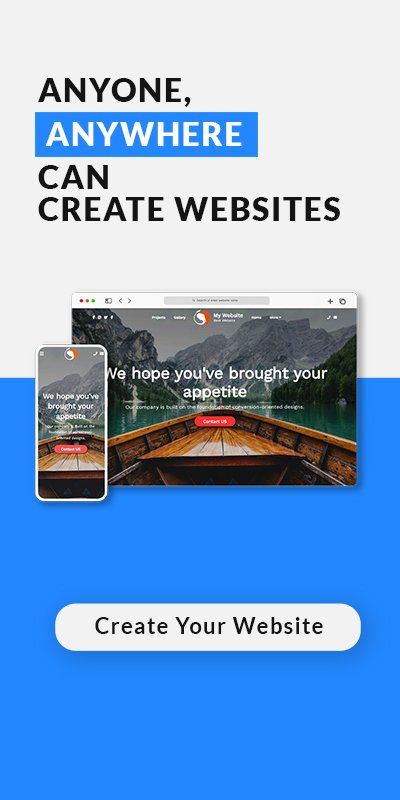A blog, which can be a complete website or just a piece of one, is a place where you can contribute articles about a topic you're enthusiastic about. A blog will usually include both written and visual features, all of which will be presented in an easy-to-read article format so that readers can quickly browse and discover what they're searching for.
Table of Contents
1. Why Should You Create A Blog?
2. How To Start A Blog In 2022: JoonWeb's Guide
3. 10 Best Ways To Start A Successful Blog In 2022: Explained In Detail
Why Should You Create A Blog?
People establish blogs for a number of reasons, including the following:
Share Your Thoughts With The Rest Of The World: Sometimes all you want is to be heard and have your thoughts broadcast into the universe. A blog can help with this because it's a form of communication and an area that's all yours.
You can use your imagination and enthusiasm to design a location that is uniquely yours, where you can share your knowledge, expertise, and experiences. Peopls set up a blog to spread awareness about their topic of knowledge
Make A Pitch For A Product Or Service: A blog is frequently used by small business owners as a type of content marketing. Written content can be an effective technique to engage potential customers and make them feel more connected to the product or service you're selling.
Make A Profit With Time & Commitment, Blogging May Be Profitable: The greatest approach to realise the financial benefits of your labor is to provide high-quality material on a regular basis that attracts new readers and increases traffic to your website.
This will help your blog attract sponsors and can also help you establish yourself as an online influencer, which can lead to affiliate marketing opportunities.
Create A Virtual Community: We no longer need to live in the same city, state, or even nation to feel linked to people thanks to the internet. A blog is a place where you can share your experience, and ideas, and start conversations with individuals who share your interests from all over the world.
A blog usually features a comments section where readers can directly communicate with you, allowing you to engage in dialogue and create relationships.
If your wondering how to start a blog in 2022, then you've come to the right place. You can't go wrong with blogging as the initial step toward pursuing your ideal job or favorite activity. While creating a blog may seem difficult, We'll walk you through each step to make the process as painless as possible.
The procedure is straightforward, and you'll have your blog up and running in no time. This step-by-step guide will provide you with all of the information and resources you'll need to get started with a blog. You'll discover how to launch your website, compose your first blog post, and attract dedicated followers.
Doesn't it seem exciting? Let's get started. 10 best ways to start a successful blog in 2022 have been given below. First of all, let's take a look at how to start a blog in 2022.
How To Start A Blog In 2022: JoonWeb's Guide
- Make a Decision On a Blogging Platform. Make use of a platform that allows you to customise the templates.
- Choose a Web Hosting Platform. Consider a platform with sufficient bandwidth, uptime, and customer support.
- Find The Best Niche For You. Concentrate on a single theme and a specified target audience.
- Choose a Name For Your Blog & a Domain For It. Choose a name that is descriptive and piques readers' curiosity.
- Create & Customise Your Own Blog. Use visuals and effects that are related to the topic you've chosen.
- Make a List Of Potential Blog Topics. Before you filter down your topic choices, write down all of your ideas.
- Make Your First Blog Entry. Use a compelling title to pique your audience's interest, and use headers to make the content skimmable.
- Make An Editorial Schedule. Make a calendar to help you stay on track with your publishing and hold yourself accountable.
- Promote Your Blog On Social Media. To increase your reach, use marketing methods.
- Make Money With Your Blog. Take advantage of monetization opportunities for your blog.
10 Best Ways To Start A Successful Blog In 2022: Explained In Detail
Make a Decision On a Blogging Platform
Selecting a blogging platform for posting your material is the first step in beginning a blog. A short Google search will reveal that there are a variety of sites that cater to bloggers from various businesses. JoonWeb is a good all-around blogging platform that meets most purposes.
JoonWeb's blogging platform is simple to learn and use, with a wide range of beautiful design options and themes to choose from. It also has tools for analyzing your blog's performance and monetizing your material, which will be useful as you grow your readership.
Choose a Web Hosting Platform
You'll need to choose a hosting platform after you've decided on a blogging platform. A blog, like other forms of blogs, necessitates the use of a web server. This basically means that webpages are saved on a server with a unique address so that visitors may find them easily.
You won't need to find a separate web host if you use some blogging platforms that provide hosting. If you create a blog website at JoonWeb, then you will get free hosting services.
You'll need to select and pay for a separate hosting platform if you develop a custom website without JoonWeb. Among the most popular choices are:
-
Hostinger
-
HostGator
-
GoDaddy
-
Amazon Web Services
Factors that are extremely vital while choosing a hosting platform include- bandwidth, uptime, & customer. After you've decided on a blogging platform and a hosting provider, you can start brainstorming blog ideas.
Find The Best Niche For You
Let's get away from the technical and into the realm of theory. Take a step back and consider the most important aspect of your blog's foundation, from its URL and domain name to its content and design: your blog's niche. What exactly do you want to write about on your blog?
When it comes to topics, there are virtually no limitations. The most important thing is to choose a specific topic area that will serve as the focal point of your entire blog. Fashion blogs, marketing blogs, and cuisine blogs are all examples of possible blog genres. Because there are so many blogs devoted to the same topics, you'll need to find a way to stand apart while still writing about what you enjoy.
Fashion blogs, marketing blogs, and cuisine blogs are all examples of possible blog genres. Because there are so many blogs devoted to the same topics, you'll need to find a way to stand apart while still writing about what you enjoy.
Choose a Name For Your Blog & a Domain For It
When you're considering how to start a blog, the question of what to call it is almost certainly on your mind. There are three primary paths you can go with the name of your blog. These are some of them:
- Your name & surname
- The name of your company (if you have one)
- A unique new moniker
You should also consider the personality you want your blog to represent while naming it. Is it necessary to keep everything official and professional?
Are you looking for something sweet and romantic? Offbeat & edgy? If you're having trouble coming up with a name for your blog, this blog name generator can assist.
Create & Customise Your Own Blog
- Select a blog template. Using a pre-designed blog template is the most effective approach to get your blog up and running. After then, you can personalise it according to your tastes. Make sure the one you choose reflects the topic of your blog.
Whether you're a culinary blogger, a photography blogger, or a business blogger, there are website templates for you. Consider, for example, the mood you want your website to convey while you surf. Whether it's traditional, modern, tough, or minimalist, there's something for everyone. - Make a decision about which pages to include. Here's a rundown of the various options:
- About page: This page tells visitors who you are, what you do, and why you do it, giving your blog some context and humanising your content.
- Contact Page: you can include your email address so that fans and possible business partners can contact you.
- If you're planning to sell things linked to your blog, you'll also want to create a separate Online Store Page.
- Obtain a search engine indexing. Making ensuring your blog is seen on Google and other search engines is another aspect of launching a blog. If you want your material to appear in search results, you'll need to take care of this stage as soon as possible.
To begin, check to see if your website has been indexed by Google. Essentially, this implies alerting Google to the existence of your blog. You can do this by submitting your sitemap to Google Search Console. - Make a logo for your blog. Finally, add an eye-catching blog logo to your site. This is another approach to give your site personality, and it's a must-do if you want to build a blog that grows into a well-known brand.
Make a List Of Potential Blog Topics
Your blog is now ready to launch in terms of technology. It's time to start considering which topics you'll tackle first. Begin by reflecting on your niche-related experiences, achievements, disappointments, or discoveries.
Consider these suggestions if you're having problems coming up with blog subjects for your keyword research:
- Examine your previous content to find the topics that have sparked the most interest and interaction.
- Consider which blog subjects your clients are most likely to inquire about when they contact a sales representative.
- Write about the newest news and advancements in your industry to establish thought leadership.
You should concentrate on coming up with topic ideas and articles that bring value to your audience by addressing their needs and worries. The next step is to optimize your content.
For 2022, the most profitable blog niches are:
- Blogging and making money online.
- Health & Fitness.
- Personal finance & investing.
- Digital Marketing.
- Food Recipes.
- Personal Development.
Make Your First Blog Entry
- Begin by conducting keyword research. Finding the proper keywords is critical if you want people to read your articles. By focusing your article on specific phrases, you enhance the likelihood of your blog appearing in search results pages for those terms.
- Make a title for your blog post. The next step in writing a blog piece is to think of a catchy title. You can come up with blog titles at any point during the planning process, but the finest ideas usually occur while you're putting together your outline.
- Make a list of your essential points. Select the sort of blog post you want to write. Is it going to be a how-to manual? Is there a product suggestion? Is this an op-ed piece?
You should have a clear idea in mind before building the outline, regardless of the blog post template you use. - Make content that is interesting to read. Grab your audience's attention with a riveting narrative, a striking quotation or statistic, or an intriguing fact in the opening. Then, give a quick overview of what the piece is about, taking care to pique your readers' attention.
Then, using your outline as a guide, create the body text. As a blogger, this is where you offer your skills and expertise. - Image Insertion. As you begin your blog, keep in mind that the images you use can help visitors form a positive impression of your content. Whether you use images, screenshots, or graphics in your posts, they must be both functional and attractive.
Make sure they express your primary points and draw attention to key examples in the article. If you don't have your own photos, start by looking for free stock photos online. Pexels and Unsplash are two well-known photo-sharing websites. - Make your website SEO-friendly. There are a few things you'll need to take care of after you've finished writing your content before hitting Publish. From enhancing your blog's SEO to producing conversions through your article, these measures are all about strategy.
- Editing & Publication. Everything you'll need to write your first blog post is now in your possession. Give it a couple of reads and then share it with family or friends for feedback. Having a second, third, or fourth set of eyes is usually beneficial.
Make An Editorial Schedule
Whew! You've just published your very first blog entry. Take a break, then plan out the rest of the month's publishing schedule when you're ready.
Starting a blog requires you to create an editorial calendar. It's a good approach to make sure you publish content on a regular basis, hold yourself accountable as a writer, and stay on track with your writing goals. Your readers are expecting new content, and you must provide it.
Furthermore, while calculating your site's overall position, search engines consider how frequently you publish. If you're prone to procrastinate (and who isn't? ), create a Google Calendar and enter your deadlines there. You can even block off time for writing on your calendar. '
Promote Your Blog On Social Media
You have everything you need to start a blog at this point. The next two sections will focus on how to get the word out about your blog and turn it into a viable revenue generator.
You'll need to think of new strategies to drive traffic to your site if you want to attract readers.The tactics listed below can also assist you in promoting your blog.
- Share your content on social media: Social media is a great way to share your content and get people to notice your blog. It's a terrific approach to find new readers whether you promote your blog on Facebook, Instagram, Twitter, or LinkedIn.
- Make a newsletter for your blog: Send out a weekly email newsletter to keep your readers interested and returning to your blog. This will assist you in maintaining a dedicated fan base.
- Contribute to other websites: By producing content outside of your own website, you can improve your reputation as a writer and authority in your field.
- Make contact with an existing group: Facebook groups, forums, and LinkedIn groups are locations where people who are interested in a specific issue can come together.
- Participate in online question and answer forums: Quora and Reddit, for example, allow you to highlight your blog in discussion threads.
- Invest in paid advertisements: You can increase the reach of your postings by paying for a paid promotion in addition to sharing them on social media. You may also pay for Google ads to reach new users via the search engine.
- Experiment with new content formats: Extend your reach even farther by experimenting with different content types. These are essentially repurposed versions of the information you've already supplied in your posts.
Make Money With Your Blog
Following are some of the ways through which you can monetize your blogs:
- Affiliate marketing is one of the most prevalent ways for bloggers to generate money, and it's simple to get started. Intermediate affiliates can earn between $300 and $3000 per day, and their earnings will only increase as their experience grows.
- Advertising on your blog: Another alternative is to put advertising on your blog, which essentially means you're selling ad space on your site. Because you'll be earning money with each click, this is a reasonably reliable way to generate money.
If you're considering this path, Google AdSense is by far the most lucrative and well-known scheme. Another alternative is to place advertising on your site, which essentially means you're selling ad space on your blog. - Offering paid subscriptions: You know how you have to pay to read the New York Times? You can do something similar with your blog. While part of your articles should be free, you can also develop unique content that visitors can subscribe to.
- Create content for sponsors: Reach out to corporations about sponsorship options, or make it easy for brands to contact you as your site expands. You'll be producing articles to promote the products of those companies, and the companies will pay you for your work.
You can also sell e-books and items directly from your website. Branded stuff, products relating to your field, or e-books and other online resources are all possibilities.






